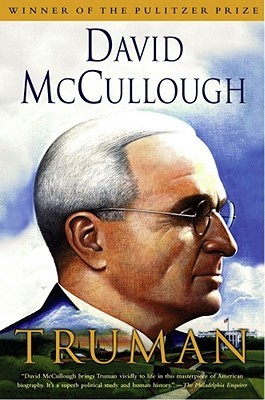Review: David McCullough’s “Truman”
by Miles Raymer

“The past has always interested me for use in the present.”
So wrote the aging Harry S. Truman in a 1954 letter to Dean Acheson, his former Secretary of State and dear friend. This observation is reason enough to investigate Truman’s life, a life that still echoes in our modern age. But the reason I picked up David McCullough’s Truman was far less grand: he is my mother’s favorite president and I wanted to find out why. That task proved fairly easy to accomplish, and I also took away a few insights regarding how America’s recent past can inform its present.
Truman is a text so teeming with detail that I often found it overwhelming. History buffs will feel right at home, but I can’t personally say that cracking it open was always an unalloyed pleasure. Much of it felt like obligatory reading, but there were also moments that jumped out with the clarity and verve of a great novel. McCullough comes off as a relatively objective biographer, but at the same time he clearly adores Truman and wants to make him look good. I’ll do my best to distill my takeaways into a few brief paragraphs.
First off, Truman seems to have genuinely been a “man of the people.” He came up as a farmer in Missouri, fought in World War I, struggled with finances pretty much his whole life, and didn’t have a fancy elite education. He knew and cared about the challenges faced by common Americans much more than the typical politician of his era, and consistently steered his political decision-making toward policies that he thought would serve the nation’s general welfare. He made plenty of mistakes, but usually owned up to them. He cared about the people on his staff and always treated them with professional affection and respect. He kept his cool while making many of the hardest decisions that have ever barged into the oval office.
Surprisingly, Truman is also a wonderful tale of real-life romance. The story of Truman’s courtship and eventual marriage to Bess, his boyhood crush, is incredibly heart-warming. I’m sure the relationship wasn’t perfect (impossible!), but it added a feel-good element to the book that I wasn’t expecting but greatly appreciated. I wish all people seeking life-long companionship could be as lucky as the Trumans.
As far as his political career, Truman is proof that politics is a messy business. His ethical aspirations were constantly buffeted by the grim realities of entrenched power structures, fickle public opinions, wars of unprecedented scale, terrifying new technologies, and a rowdy media. Whether his time as president resulted in a net gain for America and the world is a question for a real historian, but this amateur thinks he managed to come out looking pretty good in the final analysis. McCullough says it best:
Born in the Gilded age, the age of steam and gingerbread Gothic, Truman had lived to see a time of lost certainties and rocket trips to the moon. The arc of history spanned more change in the world than any prior period in history. A man of nineteenth-century background, he had had to face many of the most difficult decisions of the unimaginably different twentieth century. A son of rural, inland America, raised only a generation removed from the frontier and imbued with the old Jeffersonian ideal of a rural democracy, he had had to assume command of the most powerful industrial nation on earth at the very moment when that power, in combination with stunning advances in science and technology, had become an unparalleled force in the world. The responsibilities he bore were like those of no other president before him, and he more than met the test.
Ambitious by nature, he was never torn by ambition, never tried to appear as something he was not. He stood for common sense, common decency. He spoke the common tongue. As much as any president since Lincoln, he brought to the highest office the language and values of the common American people. He held to the old guidelines: work hard, do your best, speak the truth, assume no airs, trust in God, have no fear. Yet he was not and had never been a simple, ordinary man. The homely attributes, the Missouri wit, the warmth of his friendship, the genuineness of Harry Truman, however appealing, were outweighed by the larger qualities that made him a figure of world stature, both a great and good man, and a great American president. (991)
Is this a rose-tinted summary? Yes, I think so. But I also think it points to something important, something that modern America has lost and ought to seek again. It is the soul of a conscientious conservatism made tough by tradition, and also the heart of a laudable liberalism committed to progress. In this perilous and divided moment, Americans from all walks of life should try to channel our inner Truman.
Rating: 6/10
Nicely done Miles! I found this to not only be a great book, but one that sits and sticks with you over time and in a good way. Your review was well written. Hope you come to enjoy the book even more as it sits and sticks:)
Thanks Barnaby! Really appreciate you taking the time to read my review and write this nice comment. Looking forward to discussing soon! 🙂
“Courage is contagious. If a leader shows courage, others get the idea.”
–David McCullough
“There are no people on earth in whom a spirit of enthusiastic zeal is so readily kindled, and burns so remarkably, as Americans.”
–David McCullough